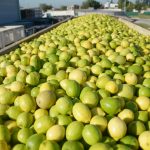Argentina seeks new blueberry route to U.S.
As the first cab off the rank for the Southern Hemisphere blueberry export season, Argentina's Tucumán province can get good prices for its fruit in the U.S. market but logistics are not always in its favor. While facilities in the region's main airport are improving, the industry is keen to boost its volumes sent by ship from Chile. At www.freshfruitportal.com we speak with Tucumán Blueberry Producers Association (APRATUC) manager Guillermo Olivera about the negotiations underway.
Olivera says growers have a great dependence on air freight operations for exporting their blueberries to foreign markets.
"It is not profitable to contract an empty plane from the U.S. to carry our cargo, and that's why the only way to charter planes from Tucumán is to utilize aircraft that go with cargo to Ezeiza [Buenos Aires] or Brazilian airports," he says.
"We are at the mercy of what happens with the regional air cargo market to Brazil and Argentina to charter our fruit back to Miami. The same is the case for Europe."
He adds the province's logistical problems have been minimized to an extent through some direct 10-hour flights to Miami, removing the congestion that affects the fruit in other airports.
He also highlights the start of works on cold storage facilities at the Tucumán International Airport, which will be followed by the construction of a cargo bay area and runway adequacy improvements.
"The airport has been recently converted to the 24H category so it can operate 24 hours a day, 365 days a year. Given that Ezeiza is also available, our airport adds another alternative for shipments leaving the country."
Negotiating a new route
Olivera says it is important growers have more logistical options, which is why the industry hopes it can expand its maritime shipping alternatives from Chile.
He says the industry currently has the possibility of shipping from the Chilean port of San Antonio in the V (Valparaiso) region, first transporting by land to Mendoza and crossing the Andean border at the Los Libertadores pass.
However, Tucumán is much further north of San Antonio, and so the province's authorities are in negotiations with the government of Chile's II (Antofagasta) region to open up a closer route.
"The Tucumán government is working with the government of Chile's northern area to improve competitive advantages for both zones," he says.
"We don't have any agreement yet in terms of regional integration, but we could say that we should have an exit via Chile through the port of Mejillones."
Importance of air freight
The APRATUC manager says while the route via Chile would be positive, air freight from the point of production remains very important.
"It allows us to arrive quickly to consumer markets for our fruit, reducing the problems of undersupply. The speed of market arrival also minimizes quality problems on arrival.
He highlights the maximum distance between blueberry dispatch centers and the airport is never more than 100km (62 miles).
In 2011-12 the industry exported 3,800 metric tons (MT), while the province registered 59 flights with fruit, sourced locally and from Metan, Salta.














































